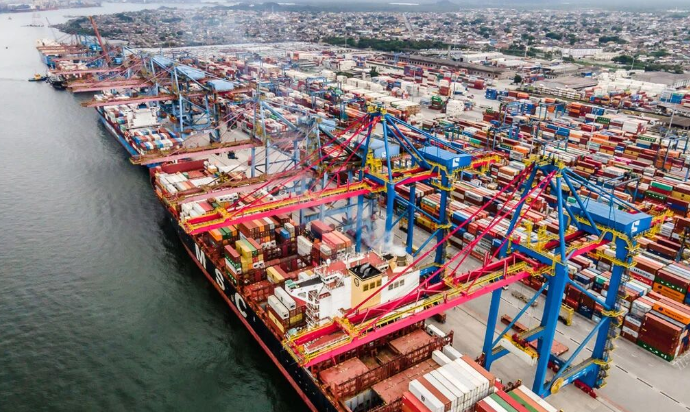
The port of Santos in Brazil is the largest port in the country. According to the rankings by the global shipping authority publication "Lloyd's List," the port has risen 6 positions, moving from 43rd to 37th place globally, and it holds the top position in Latin America in terms of container throughput volume.
Reports indicate that in 2024, the throughput volume at Santos Port reached 5.4 million standard containers (TEUs), marking a 14.7% increase from 2023. This performance has surpassed several significant ports worldwide, including Valencia Port in Spain, Abu Dhabi Port in the UAE, and Piraeus Port in Greece, underscoring its critical role in enhancing Brazil's economic, agricultural, industrial, and export supply chain competitiveness.
As of 2025, Santos Port continues to experience robust growth in throughput volume. In July alone this year, the port set a new monthly throughput record, reaching 534,600 TEUs, an 8.5% increase from the same period in 2024. The cumulative container throughput volume from January to July this year reached 3.3 million TEUs, representing a 7.9% year-on-year increase.
In addition to container throughput, Santos Port has seen comprehensive improvements in other cargo types such as dry bulk and liquid bulk. July 2025 became the month with the highest total cargo throughput in the history of Santos Port, reaching 17.4 million tons, an increase of 10 million tons compared to July 2024.
The port's exceptional performance is attributed to continual influxes of public and private investments, aimed at modernizing the port and enhancing its operational capabilities. One significant project involves constructing two new berths for handling liquid bulk in the Alemoa area of the port, expected to attract an investment of 4 billion reais. Additionally, the privatization auction for Tecon Santos Terminal 10 is set for December 2025, with the potential to increase container throughput capacity by 50%.
On the left bank of Santos Port, DP World has initiated an expansion project at its terminal, planning to extend the berths by 190 meters, reaching a total length of 1,290 meters, and introducing new quay handling equipment. By 2026, the terminal is expected to achieve an annual throughput capacity of 1.7 million standard containers.
Simultaneously, expansion-related studies in other areas of the port are progressing, with the first phase set to be released by October this year. These initiatives are crucial for unlocking new strategic areas, attracting investments, and aligning port operations with local environmental and urban planning requirements.
These actions collectively form the largest concession plan in the history of Brazilian ports, led by the federal government through the Ministry of Ports and Airports.
